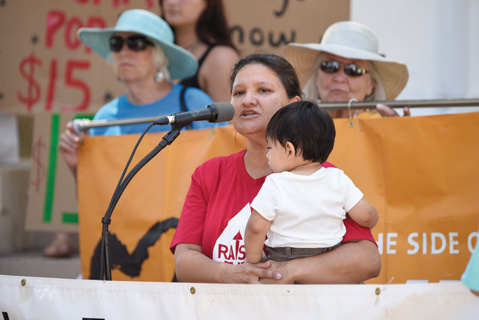New Minimum Wage Initiative Unveiled
Labor Unions, Democratic Activists Want Pay Increased to $15 an Hour

After months of preparation and quiet agitation, a number of labor unions and activist organizations associated with the Democratic Party unveiled plans to launch a ballot initiative for the November 2016 election that would increase the minimum wage within the City of Santa Barbara to $15 an hour. Organizers say the wage hike would be phased in over time, though the details remain to be worked out. The current minimum wage is $9 an hour.
For one of the unions leading the campaign, Service Employees International Union (SEIU), its Healthcare Workers West group is collecting signatures to qualify an almost identical statewide initiative for the same election. According to a recent Field Poll of 1,555 registered voters, 68 percent of the respondents either strongly supported or somewhat supported bumping the minimum wage to $15 an hour.
About 150 people showed up to a Labor Day rally held in front of the bandstand at Pershing Park near Santa Barbara’s harbor — selected because of the proximity of so many waterfront hotels and restaurants — to demonstrate support for the city’s initiative, including members of the United Food and Commercial Workers Union (UFCW) and SEIU Local 721. Spearheading the effort are organizers with the group CAUSE (Central Coast United for a Sustainable Economy), politically progressive grassroots organizers with active field operations in Ventura and Santa Maria who often work in conjunction with the Democratic Party.
CAUSE director Maricela Morales said as of 2013, one in four workers in Santa Barbara earned less than $15 an hour. Of the city’s 51,000 employees, CAUSE said 8,000 now make just the minimum-wage. In the meantime, Morales added, real wages have dropped since the Great Recession, while average rent for a two-bedroom apartment jumped from $1,500 a month to $2,400. Morales noted that 92 percent of employees making less than $15 an hour were adults, not teens. Of those, 42 percent are raising children.
Speaking in Spanish, a woman introduced as Angelina told the crowd she worked for a local hotel from 32-40 hours a week earning minimum wage; her husband, she said, worked two minimum-wage jobs, but together they didn’t make enough to afford their own place. As a result, she said, they share an apartment with another family. Reverend Julia Hamilton, representing the Santa Barbara Unitarian Society, said those struggling to make it in Santa Barbara must contend with the dueling voices of hope and fear. The proposed wage increase, she said, represented hope. “We’re only talking about the basics,” she added. “We’re not talking about the extras.”
Even conservative economists — hostile to such ballot initiatives — concede that wage increases have been conspicuously absent from the economic recovery both nationwide and in Santa Barbara. That’s been especially true for food workers and those working in the tourist industry. Efforts to increase the minimum wage federally have been effectively stymied, as have various statewide campaigns. In response, SEIU has pushed aggressively in city-by-city efforts. New York, San Francisco, and Los Angeles have all enacted pay increases. Many smaller cities have done the same.
CAUSE organizer Lucas Zucker argued the initiative would put $63 million into the pockets of people who would spend it locally, which would prove beneficial to the local economy. “We hear a lot about job losses and economic collapse, but economic studies don’t bear that out,” he said. Ken Oplinger, head of the Santa Barbara Chamber of Commerce, acknowledged such studies existed, but wondered whether employers would trim their workforces in response. He added, “It certainly hasn’t escaped the notice of the business community that this announcement comes one month before City Council ballots are in the mail. I would be shocked if this doesn’t become the number one issue in the campaign, which would benefit the proponents and certain council candidates.”
Attending the rally were city councilmembers Cathy Murillo — now running for reelection — and Gregg Hart. Not present were Mayor Helene Schneider or 1st District Supervisor Salud Carbajal — now running against each other for Congress. Both were campaigning in San Luis Obispo at the time, but both have endorsed the minimum-wage increase.
City councilmember Randy Rowse, now running for re-election, also owns the downtown Paradise Cafe and said he’d rather “attach my tongue to my forehead with a staple gun” than to engage in a debate pitting “social justice” against basic economics. “It’s not alarmist hyperbole to say that jobs are at stake,” he said. “Home Depot will be the model with acres of product and self check-out,” as other employees “go the way of gas station attendant.” Rowse said the average full service restaurant nets less than 5 percent in revenues a year; labor, he said, accounts for about 40 percent of the cost.
Zucker said the signature gathering would begin in earnest early next year.



